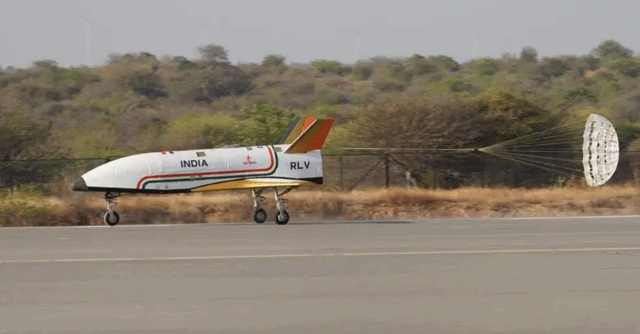
ISRO successfully tests unmanned landing of reusable rocket


The Indian Space Research Organisation (ISRO) on Sunday announced the successful completion of the first unmanned landing process of its under-development reusable rocket. Called the Reusable Launch Vehicle Autonomous Landing Mission (RLV-LEX), the mission took off from ISRO’s Aeronautical Test Range (ATR) in Chitradurga, a district 200km from Bengaluru in Karnataka, at 7:10AM on April 2. The rocket landing module was lifted to a height of 4.5km with a helicopter, and released in order to simulate a space re-entry maneuver, and a subsequent landing process.
In a mission success statement released by ISRO on Sunday, the RLV-LEX demonstrator module was a smaller version of the actual reusable rocket that ISRO is building, which will be 1.6x larger in size, and presumably play a role in manned space missions in future. There were over 10 parameters that simulated an actual sub-orbital space re-entry experience of a rocket module, creating similar altitude, pressure and temperatures on the module and its components.
A sub-orbital space re-entry refers to a rocket module that reaches the outer atmosphere but does not attain escape velocity — the speed required to escape Earth’s gravity, and therefore enter the planet’s orbit. Such rocket modules are common for manned space missions, space reconnaissance tasks and other related activities. Reusable rockets, in this regard, reduce the overall cost of each such space mission, and also increases operational efficiency in terms of logistics and manufacturing.

The module, which featured indigenously made landing navigation systems, sensors and guidance computers, landed back on the ATR air strip at 7:40AM, completing a 35-minute successful trial mission. The move brought India’s central space agency one step closer towards building reusable rockets for future missions.
ISRO is tipped to conduct its first test spaceflight of its proposed manned space mission, Gaganyaan, by end-2023. On the commercial front, NewSpace India Limited (NSIL), ISRO’s commercial arm, is tipped to scale up commercial satellite launch operations with its new small-satellite launcher, called Small Satellite Launch Vehicle (SSLV), onward of this year.
Private startups are also working on initial missions and launches, seeking to capture a larger share of the US-dominated global space market.

